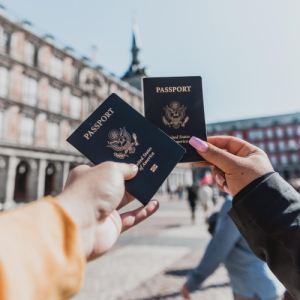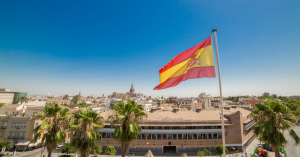
How to Get a Student Visa to Study in Spain
 Today we are pleased to welcome to the blog guest writer, Ciaran O Toole. Ciaran is from SegurCaixa Adeslas, where he is part of the English speaking team and works with clients who are looking for health insurance as part of their visa application or renewal. He is from Ireland and originally came to Spain to study Business and Spanish. He has lived in Madrid for 3 years and has been working in insurance for 2 years.
Today we are pleased to welcome to the blog guest writer, Ciaran O Toole. Ciaran is from SegurCaixa Adeslas, where he is part of the English speaking team and works with clients who are looking for health insurance as part of their visa application or renewal. He is from Ireland and originally came to Spain to study Business and Spanish. He has lived in Madrid for 3 years and has been working in insurance for 2 years.
Ciaran knows the headache of moving to Spain and his job is to help you! For that reason, we knew he was the right person to help answer some of the questions you may have on the student visa, coming to Spain, the different visas, and how Adeslas health insurance can be used as part of the visa. Without further ado, we present Ciaran…
Every year, there are many foreign students coming to study in Spain, especially for the weather, the lifestyle and the culture. Are you also looking forward to studying in Spain and are curious about the student visa procedure? If yes, this blog is for you!
1. Do I really need a student visa?
Not all students planning to study in Spain are required to apply for a student visa. If you are only studying for up to 90 days, you will not need a student visa. Instead, you can apply for a Schengen tourist visa via the BLS International Visa Management Agency if you are from a country without visa-free access to Spain. So it’s important to note that all the explanations below will not be appropriate for your case. However, this may change in 2024 with the introduction of the ETIAS visa scheme.
But, if you are a non-EU resident and plan to study in Spain for more than 90 days, you will need to apply for a study visa. This is where you need our health insurance.
2. Should I go for a short-term student visa or a long-term one?
 The type of student visa that you can apply for typically depends on the course length:
The type of student visa that you can apply for typically depends on the course length:
- Short-term student visa – Short-term study visas typically last between 91-180 days.
- Long-term student visa – The long-term visa is for those who wish to study for more than six months or 180 days. In this case, you will need to apply for a type D student visa and a NIE/TIE (Tarjeta de Identitad de Extranjero) residence permit.
3. What are the requirements for applying for a student visa?
As talked above, if you need to apply for a student visa, the next is to figure out the required documents before starting the application process.
The following example is the general documents required for each country, but you would better always check the details presented by the official website of embassies and consulates in case there are additional documents required to be submitted:
- The passport and the copy
- 3 recent ID photos (original and copy)
- Two filled-out visa application forms
- A legal authorization signed by the parents: for students below 18 years old and does not come accompanied by his or her parents
- Medical certificate demonstrating that the application does not suffer from any disease recognized by the International Health Regulation of 2005.
 Proof of enough economic means to cover the expenses of stay until the return to your country: The monthly minimum quantity must represent 100% of IPREM (564.9€ in 2021, you can consult here for the following years). If you have dependent relatives, a monthly quantity of 75% of IPREM for the first dependent, and 50% of the IPREM for each of the rest. You may also provide proof of scholarship, but you need to also specifically consult your consulate.
Proof of enough economic means to cover the expenses of stay until the return to your country: The monthly minimum quantity must represent 100% of IPREM (564.9€ in 2021, you can consult here for the following years). If you have dependent relatives, a monthly quantity of 75% of IPREM for the first dependent, and 50% of the IPREM for each of the rest. You may also provide proof of scholarship, but you need to also specifically consult your consulate.- Admission letter from your university or school, verifying your enrolment as a full-time student, leading to obtaining a degree or certificate
- Proof of private Health Insurance from an insurer recognized and authorized to operate in Spain. (Our Expat insurance meets all the requirements and has been long certified as the No.1 health insurance in Spain. We are an insurance company that speaks English.) The insurance must cover all risks normally covered for nationals and must be maintained for the entire duration of the authorization. It must cover at least all the preventive, diagnostic, treatment and rehabilitation assistance activities carried out in health centres, clinics, hospitals and urgent health transport.
- Certificate of criminal record dated no more than three months before the application date, stating that applicant does not have a criminal record in countries where it has resided for the past five years. Not applicable for students under 18 years old.
- Consular fee: It varies across consulates and years.
** Bear in mind that usually all the documents must be properly legalized and translated into Spanish.
 4. How can I make an appointment with my consulate?
4. How can I make an appointment with my consulate?
Once you have received an acceptance letter or invitation letter from your education centre, you can begin the process. You are advised to make an appointment at the consulate at least 30 days before your desired entry to Spain. Ideally, you can start the process around three months before travelling to Spain, leaving sufficient time for processing of visa application.
On the official website mentioned above, you will find easily the email of the consulate to which you belong. If there exists more than one consulate in the country you are in, you need to make sure which consulate should you go to exactly.
In the subject line asking for an appointment, you should specify the visa type you wish to apply to accelerate the process.
Then in the email, you need to specify the following information:
- The applicant’s personal details (full name, nationality, passport number, and telephone number)
- Visa type you wish to apply for
- Place of residency in your home country
- Reasons why you are requesting this visa
- Desired date for the appointment at the Consulate office (Note that they may not give you the appointment on the exact date that you prefer due to fluctuations of demands)
You will get a response email later specifying the date and time.
After applying, you will get notified of the resolution results. If your application is successful, you must collect your visa within two months from the date you are notified. If you fail to do so, it means that you have renounced your visa and the procedure will be closed.
Note that only one person can be attended at an appointment. If the applicant is with several family members, they each need to apply for an appointment.
 5. What are the next steps after obtaining the student visa?
5. What are the next steps after obtaining the student visa?
Well, pack your luggage and go!
Remember we said before the difference between long-term and short-term student visas? If you will be studying in Spain for more than 3 months (90 days), you will need to apply for your residence permit (also known as TIE/NIE) after arriving in Spain. This is also a compulsory procedure that you may find complicated.
6. What other visas can be obtained?
As well as the student visa, there are other visas that are sought after. Including the newly approved digital nomad visa which has been a big hit. The non-lucrative visa and the golden visa. The digital nomad visa is a remote working visa, the non lucrative visa is a non working visa and the golden visa is an investment visa.
Reference:
[1] VISADO DE ESTUDIOS . (2021). Retrieved 1 August 2021, from http://www.exteriores.gob.es/Consulados/MEXICO/es/InformacionParaExtranjeros/Paginas/InformacionVisadosyOtrosTramites/visado_de_estudios.aspx
[2]Applying for a visa. (2021). Retrieved 1 August 2021, from https://www.educacionyfp.gob.es/eeuu/convocatorias-programas/convocatorias-eeuu/nalcap/visa.html
 For more details you can contact me below.
For more details you can contact me below.
Ciaran O Toole
otoolec@oac.segurcaixaadeslas.es
+34 613834640




